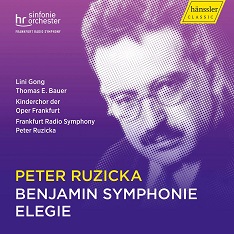Peter Ruzicka (*1948) hat seine Benjamin Symphonie für Bariton, Koloratursopran, Kinderchor und Orchester als 10-teilige symphonische Suite aus der Oper Benjamin gezogen. Die Oper thematisiert die inneren Nöte des Philosophen und Kulturkritikers Walter Benjamin, der sich auf der Flucht vor den Nationalsozialisten 1940 in dem kleinen spanischen Grenzdorf Portbou im Alter von nur 48 Jahren das Leben nahm. Für sein symphonisches Konzentrat hat Ruzicka sieben Momente aus dem Bühnenwerk ausgewählt. Einen breiten Raum in der Symphonie nehmen rein instrumentale Teile des Bühnenwerks ein: Das Vorspiel und zwei Zwischenspiele. Das ergibt eine höchst dramatische Musik, in der klangsinnliche und sogar direkt romantische Aspekte nicht fehlen, um so ein höchst eindringliches Werk von ca. 40 Minuten zu ergeben.
Am Pult des Frankfurter Radiosymphonieorchesters hält der Komponist die Orchestermusiker wie auch die Solisten zu einem packenden Musizieren an. Thomas E. Bauers kraftvolle Baritonstimme ist konturiert, und überzeugt mit markanter Artikulation. Lini Gong singt mit klarer und flexibel strömender Stimme.
Abschließend erklingt noch die zehn Minuten lange Elegie, die sehr gut ins Programm passt. Ruzicka erklärte: « Die letzten 13 Takte, die Richard Wagner schrieb und am Vorabend seines Todes im Palazzo Vendramin Freunden vorspielte, sind eine Liebeserklärung an Cosima – in Gestalt einer geheimnisvollen Frage. Die ‘Elegie‘ erscheint wie eine musikalische Selbstbeobachtung, die wie von Ferne auf den ‘Tristan‘ und die Geschehnisse seiner Entstehung verweist. Wagners Klavierskizze beschäftigte mich schon seit langer Zeit. Ihre Offenheit und Unbestimmtheit veranlasste mich zu einem ‘Fortdenken‘, zu einer sehr persönlichen musikalischen Annäherung und Entfernung. Ich wählte hierfür das klangliche Potential eines Streichorchesters, dem Impulse und ‚Schattenklänge‘ des Schlagzeugs unterlegt sind. Wagners Frage bleibt bestehen. Und sie erscheint auch heute unbeantwortbar… »
Die Elegie ist Christian Thielemann gewidmet und wird hier unter der Leitung des Komponisten höchst ausdrucksvoll aufgeführt.
Peter Ruzicka (*1948) has taken his Benjamin Symphony for baritone, coloratura soprano, children’s choir and orchestra as a 10-part symphonic suite from the opera Benjamin. The opera deals with the inner hardships of the philosopher and cultural critic Walter Benjamin, who took his own life in the small Spanish border village of Portbou in 1940 at the age of just 48 while fleeing from the Nazis. Ruzicka has selected seven moments from the stage work for his symphonic concentrate, with the purely instrumental parts of the stage work taking up a large part of the symphony: The prelude and two interludes. This results in a highly dramatic music, in which sensual and even directly romantic aspects are not lacking, resulting in a highly haunting work of around 40 minutes.
Conducting the Frankfurt Radio Symphony Orchestra, the composer encourages both the orchestral musicians and the soloists to make gripping music. Thomas E. Bauer’s powerful baritone voice is contoured and convincing with its striking articulation. Lini Gong sings with a clear and flexibly flowing voice.
Finally, the ten-minute long Elegy is heard, which fits very well into the program. Ruzicka explained: « The last 13 bars, which Richard Wagner wrote and played to friends in the Palazzo Vendramin on the eve of his death, are a declaration of love to Cosima – in the form of a mysterious question. The ‘Elegy’ seems like a musical introspection that refers to ‘Tristan’ and the events of its creation as if from afar. Wagner’s piano sketch has occupied me for a long time. Its openness and vagueness prompted me to ‘think ahead’, to a very personal musical approach and distance. I chose the tonal potential of a string orchestra for this, underpinned by the impulses and ‘shadow sounds’ of the percussion. Wagner’s question remains. And it still seems unanswerable today… «
The Elegy is dedicated to Christian Thielemann and is performed here in a highly expressive manner under the composer’s baton.


















